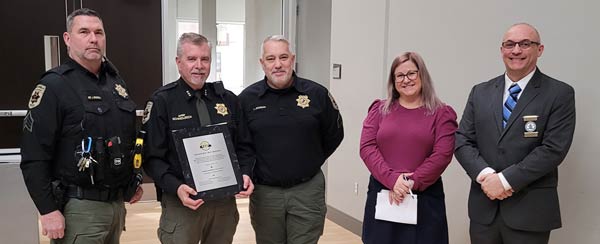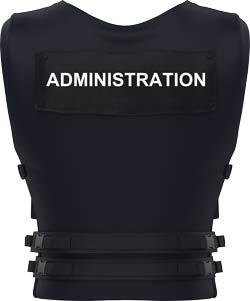 Shanon Gillette (far right) from the Illinois Law Enforcement Accreditation Program (ILEAP) joined by (L-R) Naperville Park District’s Sergeant John Driscoll, Chief Steve Schindlbeck, Sergeant Louis Jourdan and Park Board Vice President Leslie Ruffing
Shanon Gillette (far right) from the Illinois Law Enforcement Accreditation Program (ILEAP) joined by (L-R) Naperville Park District’s Sergeant John Driscoll, Chief Steve Schindlbeck, Sergeant Louis Jourdan and Park Board Vice President Leslie Ruffing
ILEAP into Accreditation
Unlike cop shows or police procedurals, nearly every police department has and follows general orders, a mechanism for law enforcement leadership to handle recurring or problematic challenges and help officers’ conduct be consistent and appropriate.
Recently, three PDRMA member-agency police departments began a pilot program in conjunction with the Illinois Law Enforcement Accreditation Program (ILEAP) to analyze their general orders, risk management policies, procedures and training, and operations. This process sets metrics, creates objectives, reviews industry best practices, helps build a stronger image within the community, develops a plan of action for agency improvement and establishes a legal defense basis in case of a lawsuit.
Of the three pilot agencies, Naperville Park District was the first to receive accreditation in December 2022. Not only was it the first PDRMA member to receive accreditation, but it’s the first park district in the state to receive ILEAP accreditation!
Why ILEAP?
 “Think of accreditation as a bullet-proof vest for administration,” says Jeff Hamer, ILEAP Director. “It makes police departments follow generally accepted best practices.” And that translates into smart risk management. “Think of accreditation as a bullet-proof vest for administration,” says Jeff Hamer, ILEAP Director. “It makes police departments follow generally accepted best practices.” And that translates into smart risk management.
For Steven Schindlbeck, Chief of Police, Naperville Park District, accreditation is part of a solid risk management plan for his department. “The analysis examines compliance with training and legal mandates (essentially laws) established by the state,” he explains. “The ILEAP Council has its standards — or best practices — to ensure officers/departments are following the best possible service-delivery guidelines.”
This accrediting is important, he continues, so the agency’s general orders and standards comply with state- and nationally recognized standards cited in ILEAP’s Standards Manual. “Accrediting also promotes community engagement and transparency,” Schindlbeck adds, “and demonstrates that we remain compliant with legislative mandates like the new SAFE-T Act.”
ILEAP’s Process
For Naperville, it began by enrolling in ILEAP’s accreditation program and training in the Power DMS program. Next came a thorough review (and updating, if needed) of policies and practices compared to established accreditation standards. ILEAP representatives also conducted a practice assessment to identify additional edits to Naperville’s general orders that the park district’s police department would need to make to pass the ILEAP’s formal assessment.
 “When we were ready, we scheduled that formal assessment,” Schindlbeck recalls. “It included a review of our files by trained ILEAP representatives as well as an on-site visit to conduct inspections, interviews and tours. That same representative then completed a formal assessment report with a recommendation that ILEAP accredit our police department. The ILEAP board reviewed his recommendation, confirmed we met the standards and awarded us accreditation this past December.” “When we were ready, we scheduled that formal assessment,” Schindlbeck recalls. “It included a review of our files by trained ILEAP representatives as well as an on-site visit to conduct inspections, interviews and tours. That same representative then completed a formal assessment report with a recommendation that ILEAP accredit our police department. The ILEAP board reviewed his recommendation, confirmed we met the standards and awarded us accreditation this past December.”
Naperville’s journey took a total of 18 months, from the spring of 2021 through last fall. It’s possible, however, to complete the process within a year, if enough people are working on the assessment simultaneously.
“ILEAP’s process is not geared toward crime prevention but toward community engagement and transparency,” Schindlbeck adds. “We already work and train very closely with the city of Naperville’s Police Department, and everyone there was a great resource as we moved through the accreditation process.
“In light of the increased scrutiny on law enforcement officers/departments nationwide, I think it’s imperative for departments to commit themselves to an internal review — either formally or informally — of their policies and practices. It leads to more consistent, practical and efficient policing,” Schindlbeck says, “which is a risk we all need to manage.” |